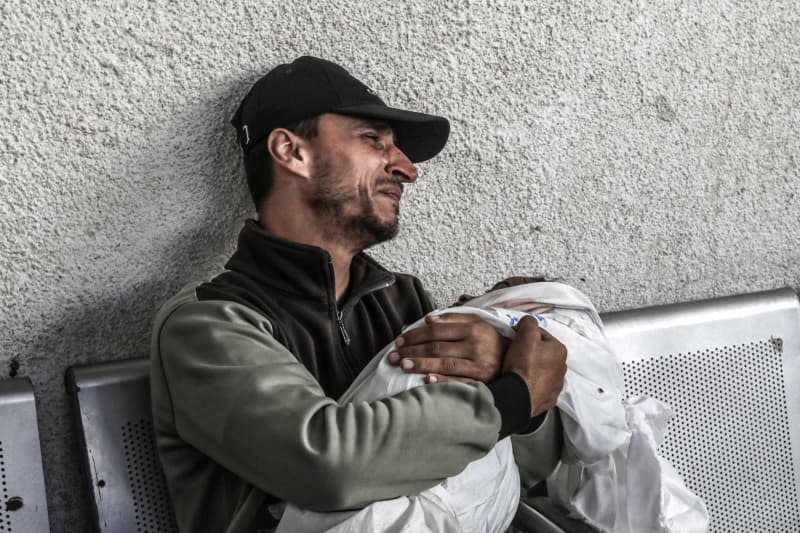New diplomatic push in Israel-Hamas war as deadly strikes hit Rafah

At least 27 Palestinians were killed in fresh Israeli attacks on the city of Rafah in the southern Gaza Strip, the territory's Hamas-controlled Health Ministry said on Monday, as diplomatic efforts intensified with talks in Cairo and Riyadh.
Authorities said 20 people in residential buildings in the border city were killed in various attacks during the night.
Seven members of a family in Rafah were also reportedly killed in a separate attack on Monday morning, they said.
An Israeli army spokesman said he could not comment without the exact coordinates of the incidents.
Israel has vowed for months to launch an offensive in Rafah, on the border with Egypt, to eliminate the remaining strongholds of the Palestinian militant group Hamas.
Israel's allies have repeatedly urged caution, as hundreds of thousands of displaced Palestinian civilians are sheltering in the city.
The planned military operation could yet be delayed, as there was some movement on Monday in the indirect negotiations between Israel and Hamas, in which Egypt, Qatar and the United States are acting as mediators.
A three-member Hamas delegation arrived in Cairo on Monday to hold negotiations on the release of Israeli hostages in return for Palestinian prisoners.
Israeli news website ynet reported that the proposal envisages the release of 33 hostages in return for the freeing of several hundred Palestinian prisoners. These are to include women, including female soldiers, elderly people, the injured and the "mentally impaired."
Citing a senior Israeli government representative, ynet reported that the duration of a simultaneous ceasefire would depend on the number of hostages released. Hamas is demanding the release of 50 prisoners for every soldier and 30 prisoners for every civilian, according to the news outlet.
The last ceasefire was in November, when more than 100 hostages were freed.
Meanwhile, Several Western and Arab foreign ministers were due to meet on the fringes of a World Economic Forum (WEF) conference in Riyadh, with US Secretary of State Antony Blinken and German Foreign Minister Annalena Baerbock among them.
Egyptian Prime Minister Mostafa Madbouly said Palestinian civilians living in Gaza were suffering "collective punishment" from Israel's retaliatory military campaign for October 7 attacks led by Hamas which triggered the war in Gaza.
"What has taken place, all Palestinians in Gaza have to pay for it," Madbouly said. "It was collective punishment - not punishment for Hamas, but for all Palestinians living in the Gaza Strip."
Israel's response to the massacre that left some 1,200 people dead and hundreds more taken hostage "was unbelievable," he said at the economic conference in Riyadh. More than 80% of the health facilities in Gaza had been destroyed, he said, while an "estimated 7,000 [people] remain under the rubble."
The Egyptian prime minister said it would take "decades" for Gaza to recover.
Blinken pointed the finger squarely at Hamas and said it had to act: "We strongly support Israel and its effort to ensure that what happened on October 7 never happens again, but at the same time we are determined to do everything we can to bring an end to the terrible human suffering that we are seeing every single day in Gaza among children, women, men who've been caught in a terrible crossfire of Hamas' making.
"Right now, Hamas has before it a proposal that is extraordinarily, extraordinarily generous on the part of Israel and in this moment the only thing standing between the people of Gaza and a ceasefire is Hamas ... They have to decide and to decide quickly," Blinken said.
The White House urged Hamas to accept the ceasefire and hostage exchange deal.
"In recent days, there has been new progress in talks and currently, the onus is indeed on Hamas," White House spokeswoman Karine Jean-Pierre said on Monday. "There is a deal on the table and they need to take it," she added.
"We believe that all efforts need to be brought to bear to convince Hamas to accept the proposal immediately."
"It is way past time to get these hostages home" Jean-Pierre added.
"It was way past time to get to a ceasefire, and we need to make sure we continue to get that humanitarian aid, as we know it is a dire situation in Gaza."
US President Joe Biden urged Egyptian President Abdel Fattah al-Sissi and Qatari Emir Tamim bin Hamad al-Thani on the phone to make every effort to secure the release of the hostages held by Hamas, the White House said on Monday evening.
If an agreement accepted by Israel were to be reached, the US would endeavour to ensure that it was adhered to, the statement continued.
In his talks with al-Sissi, Biden also emphasised that Palestinians should not be expelled to Egypt or any other place outside the Gaza Strip.
As of Monday, the Gaza health authority put the number of people killed in the Gaza Strip since the start of the war at 34,488. More than two thirds of those killed are women and children. The figures are regarded as largely credible by the UN and human rights organizations.

